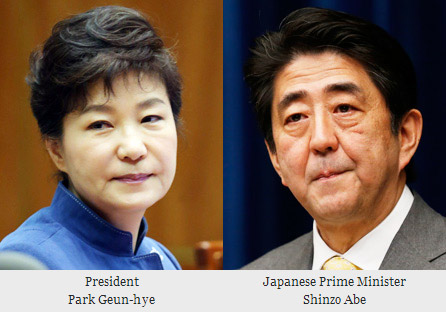- California Assembly OKs highest minimum wage in nation
- S. Korea unveils first graphic cigarette warnings
- US joins with South Korea, Japan in bid to deter North Korea
- LPGA golfer Chun In-gee finally back in action
- S. Korea won’t be top seed in final World Cup qualification round
- US men’s soccer misses 2nd straight Olympics
- US back on track in qualifying with 4-0 win over Guatemala
- High-intensity workout injuries spawn cottage industry
- CDC expands range of Zika mosquitoes into parts of Northeast
- Who knew? ‘The Walking Dead’ is helping families connect
Freedom (?) of Press in Korea and Japan
Korea sits in 57th, Japan in 59th place in the 2014 World Free Press Index - lower than El Salvador, Haiti
This week’s news cycle has been dominated by one issue in South Korea . The scandal surrounding the presidential office has enflamed public discourse in Korea.
It has been a difficult second year in office for Park Guen-hye, and 2014′s final month has proven no less trying for the President. After the sinking of the ferry Sewol and the criticism heaped on her in the aftermath, Park’s reputation has taken another hit with the latest revelations concerning her former aide Jeong Yun-hoe and his influence in the corridors of power.
How someone reacts when under threat is always telling, and so it proved after Jeong’s alleged role within Cheong Wa Dae was brought to light last Friday by the Segye Ilbo newspaper.
Critics of the President say that avoiding criticism, fair or otherwise, has been central to her leadership so far. Perhaps it was not so surprising then to hear that senior figures at the Segye Ilbo newspaper were being sued for libel for its coverage of the story.
Speaking on the subject, President Park said that: “Making claims without checking basic facts will put the nation into chaos and cause conflict within our society,” before adding, “We should make sure that such rumors do not unsettle the country.”
The newspaper’s original story was based on the now infamous report leaked from within Cheong Wa Dae itself. With various presidential aides coming forward in the meantime to confirm the existence of the documents, it would be hard to argue that the Segye Ilbo’s article last Friday was baseless.
With the prosecution now investigating all of the key players implicated in the scandal, the difference between cold, hard facts and rumors will hopefully be uncovered soon.
Regardless of that, even if the Segye Ilbo’s coverage last Friday is entirely vindicated, the paper could still have a day in court ahead of it. Such are the downright baffling intricacies of the Korean defamation law. Although the article in question and the allegations it put forward are certainly in the public interest, it’s not inconceivable that the daily title could still face a stiff penalty.
In 2011, the United Nations’ special rapporteur on the freedom of opinion and expression, Frank La Rue, commented on the libel laws of South Korea, saying thus: “Many criminal defamation suits are filed for statements that are true and are in the public interest, and used to penalize individuals who express criticisms of the government.”
Since then and with the election of President Park, South Korea’s status as a nation where freedom of expression is regularly curtailed hasn’t changed much. Shortly after coming into power, the President made the right noises, introducing the Government 3.0 initiative aimed at freeing up information disclosure.
This initiative did not lead to much in the way of real change, however, which is reflected in the fact that Korea currently sits in 57th place in the 2014 World Free Press Index. To put that position in context, it’s not the worst (Eritrea is in 180th place), but it’s a good way off the best too (Finland). Countries such as El Salvador, Haiti and Papua New Guinea all rank higher than Korea when it comes to a free press and media, which is the cornerstone of any true democracy after all.
Even lower in the list is Japan in 59th place, and given the recent behavior of the Abe Shinzo government, that ranking may be much lower in the 2015 listings.
With the Japanese Prime Minister’s relationship with his country’s left-leaning media Arctic cold, and an election campaign on the way, he this week made the bold decision to send letters to the country’s five major television networks. The letters’ intent was by and large to ask for reporting to be carried out in a fair and impartial manner over the coming campaign.
Fair and impartial isn’t a description you would best use to describe the government’s ongoing war with the Asahi Shimbun newspaper, however.
The country’s second largest daily was recently forced to retract a number of articles published decades ago concerning “comfort women,” women that were forced into sexual slavery during the Second World War. The fact the newspaper had used an unreliable source in the articles was pounced on by those who disagree with Japan’s 1993 apology to Asian woman who suffered during Japanese Imperial rule.
Shinzo Abe himself said the articles had: “caused pain to many people and damaged Japan’s honor in international society. “His words were not received well in South Korea most of all, where many believe Japan has not shown enough repentance for its historical misdeeds.
The two countries remain at loggerheads over the issue, and the fact their respective heads of state have never even met formally is telling. Japan and South Korea’s relationship is one with historical bitterness and a great deal of acrimony; that shows little sign of abating anytime soon.
This was thrown into sharp focus with the libel trial here of Japanese journalist Tatsuya Kato. The Seoul correspondent of Tokyo-based newspaper Sankei Shimbun, he is currently facing prosecution over his story about Park Geun-hye’s whereabouts at time of the Sewol sinking.
Facing a possible seven-year jail sentence if convicted, his story published on Aug. 3 was sourced primarily from the South Korean newspaper the Chosun Ilbo. The Chosun Ilbo article had contained a rumor that the President was involved in a tryst with one of her aides, which accounted for her not being contactable for seven hours during the tragedy.
The fact Tatsuya Kato is now on trial for his article yet the Chosun Ilbo is not has led to accusations of score settling by Cheong Wa Dae.
Whatever the truth, it remains imperative that for a free media to do its job properly, then fear of prosecution should not be an overriding concern for journalists.
For Seoul and Tokyo both, there is some ways to go in this regard.

















